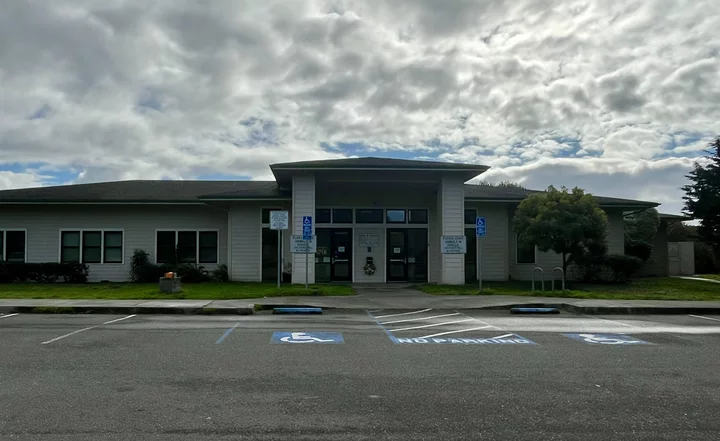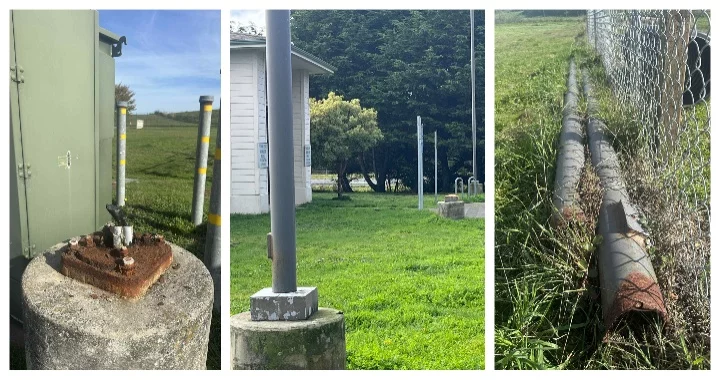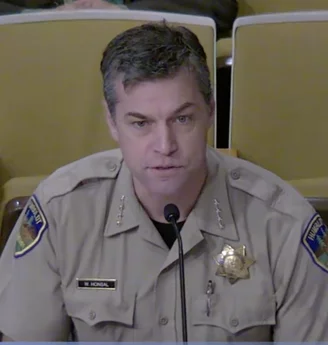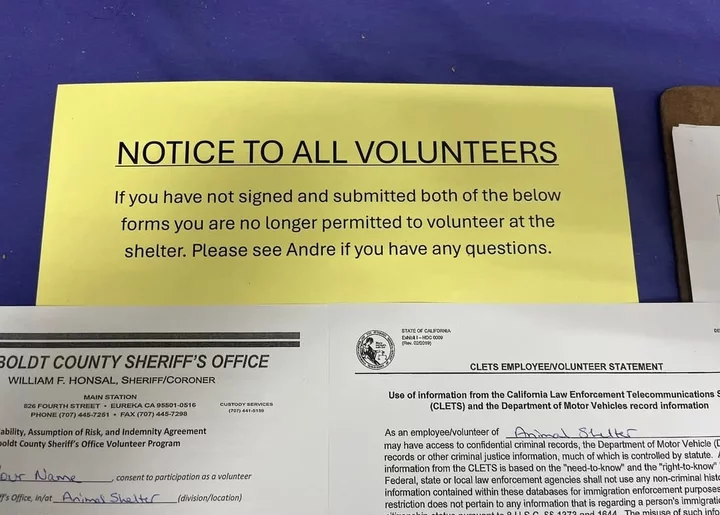The Humboldt County Animal Shelter is located north of McKinleyville, next to the county airport. | Photos courtesy Mara Segal.
###
The county government recently started requiring volunteers at the Humboldt County Animal Shelter to sign a new liability waiver. Spokespeople for the county and the Sheriff’s Office, which oversees the shelter, say it’s a fairly standard legal document, similar to ones used by other government agencies, including Cal Poly Humboldt. It was implemented at the suggestion of the Risk Management Division.
But nearly a dozen volunteers reached by the Outpost say the legal language of the waiver is far too broad: They’re being asked to assume risks that rightly belong to the county, they say, and forcing them to sign it has left them feeling insulted and unappreciated.
And yet, while they’re reluctant to sign away their legal rights, given the risks of working with animals at an aging facility in dire need of repairs, they’re also aware that if they refuse, they won’t be allowed to volunteer anymore, which will negatively impact shelter staff and animals. They feel trapped.
“The waiver relieves the county of any responsibility and puts it all on us,” a volunteer named Lucy Rapp told the Outpost. “Right now, I feel disrespected and unsupported by the county.”
Sandra Spalding, who has volunteered at the shelter for nearly 20 years, said she doesn’t blame shelter manager Andre Hale.
“I mean, this is not coming from her; it’s coming from people that just have absolutely no connection, no concern at all about the dogs and cats,” she said. “This feels like a slap in the face to all of us.”
Mara Segal is a director at the nonprofit Redwood Pals Rescue, which works hand-in-hand with the shelter, where she serves as the main volunteer coordinator. In a recent phone interview, Segal said the work of Redwood Pals and shelter volunteers is responsible for keeping the animal euthanasia rate at the shelter far below the statewide average among government-run shelters.
“We make those dogs adoptable so they don’t have to euthanize them,” Segal said.
When she read over the two-page liability waiver, she was struck by provisions requiring volunteers to assume the risks not only of their own actions, but also risks stemming from “the condition of the facilities, equipment, or areas where the events or activities are being conducted.”
That strikes her as unfair given the state of the place. Segal said ceiling tiles have been dropping for years, two rust-eaten lampposts in the parking lot have fallen down, and there’s always an element of risk when handling animals, especially when many of the current staff members are new to the job.
Segal said she’s the baby sister of a couple of attorneys, one of whom reviewed the waiver and advised her not to sign it. But that puts Segal in a tough spot.
“I’m the volunteer coordinator,” she said. “I’m the person who is supposed to tell new volunteers to sign this [and] explain to them why this is a good thing. I can’t do that. … My upbringing says you don’t compromise on something that’s really wrong.”
Janine Melanson agreed. She and other volunteers have decided that they can’t sign the waiver in good conscience.
“Others will put themselves at financial and physical risk and sign because they cannot walk away from the care of the animals,” she said in an email. “This volunteer work is something I’ve wanted to do for years — finally in retirement I have the time and energy. As I’ve spent time there, it has become very important to me. I am disappointed and sad that now I feel like I am being threatened (sign or ELSE) and pushed away by this waiver.”
Melanson typically volunteers one day per week, and today is her usual day. But this morning she reached out to let the other volunteers know she won’t be there.
“This waiver situation has me tied in knots,” she told the Outpost. “I need to step away for a bit. I hope I will be back.”
Rusted lampposts on the shelter property have fallen in recent months.
###
Volunteers contribute so much time and effort to the Humboldt County Animal Shelter that when last year’s Civil Grand Jury investigated operations at the facility, its ensuing report recommended that the county establish an annual Volunteer Appreciation Day.
The Grand Jury report says volunteers collectively donate an average of 400 hours per month to the shelter, socializing, walking and training the animals so that they’re happier, healthier and more suitable for adoption.
Segal told the Outpost that in recent months the shelter has been short-staffed, and most of the employees who are there are new. So volunteers have carried an even heavier load, donating more like 800 hours per month — equivalent to five full-time employees.
The Grand Jury report mentions a long list of deferred maintenance and safety concerns at the 20-year-old facility. “The delay in fixing the roof and outdoor lighting fixtures have created unsafe and unhealthy conditions for the staff, the volunteers, and the animals,” the summary reads. Its recommendations include finishing a reroofing project by the end of this past October and replacing and repairing the outside lighting before the end of the year.
Shelter volunteer Josh Solomon looks back on that report with bitterness.
“It seems like the county’s response to the grand jury report, which rightly recognized the importance of the volunteer group and also the need to maintain the premises properly, was to have us all sign a waiver which says that they do not need to maintain the premises properly,” he said in an email.
The waiver describes itself as “a complete and unconditional release of all liability to the greatest extent allowed by law.” It requires volunteers to acknowledge, “I understand that I am giving up substantial rights, including my right to sue,” while paradoxically making them promise to reimburse the county for any legal actions they might bring against the county.
Late last month, Segal sent an email to Sheriff William Honsal, expressing her objections to the waiver and telling him that it will drive away some of the facility’s best volunteers. At least a dozen other volunteers have sent similar messages to Honsal, county supervisors or both, she said. The Outpost has reviewed a number of these emails.
One, sent to Honsal by volunteer Christina Paleno Ericksen, says, “Our shelter provides a vital link to what makes us a civil society — care for creatures who have been neglected or abandoned and cannot care for themselves.”
Honsal wrote back, saying, “I understand that the new volunteer liability form has caused frustration among some of our long-term volunteers. Please know that I understand that frustration, and that your feedback has been heard.”
His email goes on to say that the county will not automatically deny claims brought by volunteers who’ve signed the waiver.
“Each situation will continue to be reviewed and processed through the County’s normal claims procedures, including those involving potential negligence,” he says. “The purpose of the waiver is to protect the County and by extension, the shelter and its programs, from unfounded or unjustifiable claims, while ensuring that everyone clearly understands the nature of their volunteer service.”
The county’s Human Resources Department produced a Frequently Asked Questions document for volunteers to review. It says, “Waivers are standard practice for cities and counties throughout California,” adding, “It’s not about blame or fine print — it’s about being transparent.”
If a volunteer is injured on or by county property, the FAQ document says the situation will be “reviewed and addressed appropriately per County rules and procedures.”
It goes on to say that formal language is necessary because the waiver is a legal document designed “to meet insurance and risk management requirements.” Furthermore, it is similar to waivers used “across California for volunteer programs involving animals, outdoor work, or community service.”
The FAQ responses strike a placating tone.
“We appreciate that you are taking the time to read it thoroughly and ask these important questions before signing,” it says. “[T]his underlines your serious commitment to volunteering.”
We compared the Sheriff’s Office’s liability waiver with a few others. It is indeed quite similar to the one required of volunteers at Cal Poly Humboldt (link), which says “this document is written to be as broad and inclusive as legally permitted by the State of California.” CPH’s waiver likewise makes volunteers promise not to sue over the conditions of the premises where they work.
But other agencies are less restrictive. Mendocino County, for example, requires volunteers to fill out an application, but it doesn’t require them to sign a liability waiver.
Humboldt County Public Information Specialist Cati Gallardo said the county has several different volunteer waivers that are tailored to specific volunteer programs.
“Whether a volunteer is participating in a lower risk activity, like helping at library events, or a higher risk activity, such as working at the animal shelter, they are asked to sign the appropriate waiver, so they understand the typical risks associated with their role,” Gallardo explained.
Last week, Lt. Jesse Taylor with the Humboldt County Sheriff’s Office told the Outpost via email that more than 70 animal shelter volunteers have signed the waiver. [CORRECTION: Taylor was referring to volunteers from across multiple Sheriff’s Office programs, not just the animal shelter.]
A few of the volunteers we interviewed mentioned a serious incident from last year in which a volunteer was viciously attacked by a dog. His injuries required multiple surgeries, which were covered by the county’s workers’ compensation insurance, they said.
Mara said she asked county staff directly whether this new waiver was introduced in response to that incident and was told it was entirely unrelated.
We asked Gallardo whether the waiver was prompted by any legal action against the county, but her emailed reply to several questions didn’t address that one specifically.
The volunteers we spoke with said that their work at the shelter used to feel like a valuable gift to the community and to needy animals, but the waiver requirement has made them feel like they’re being exploited.
“It seems like if we were to sign something like that, then at least there should be adequate staffing and proper maintenance to actually make sure that the volunteers and everyone else there is safe,” volunteer Ana Zurawski said in a phone interview.
“1 also feel it is inherently UNFAIR to expect the volunteers to provide free labor, often doing the same job as staff would, but not be covered for any accidents [and] not being willing to accept any liability,” said nine-year volunteer Ellen Monterie in a letter scanned and emailed to the Outpost.
Another volunteer, Danielle (who asked us not to use her last name), said the county’s liability waiver is probably not legally enforceable. “Case law pretty well establishes that public agencies can’t ask other people to be liable for their negligence,” she said.
Regardless, the county has shown no signs of backing away from the requirement. The note below is now posted in the volunteer room at the shelter.




CLICK TO MANAGE